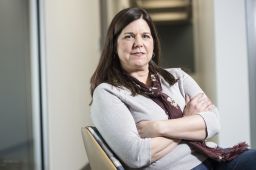Editor’s Note: Kristin Kanthak is an associate professor in the University of Pittsburgh’s political science department. She is co-editor of the State Politics and Policy Quarterly, a political science journal focusing on state politics. The views expressed in this commentary are her own. View more opinion articles on CNN.
I live in Squirrel Hill, one of the most enduring Jewish communities in the United States, and the site of a terrorist attack Saturday at the Tree of Life Synagogue, just three blocks from my house.

I can hear news helicopters over my house as I write. I’m grateful for the media that are reporting the truth of what happened here. I cannot tell you why a person would fire into a group of worshipers at prayer. But I am a political scientist, so I know a bit about the anger and hatred many ordinary Americans have against people they label as “the other.”
I know most Americans would never think of doing something so heinous, and yet many people participate in and contribute to the bigotry and stereotyping that apparently gave a sick, angry man the idea to commit this evil crime.
The dehumanizing needs to stop.
Practicing Jews make up less than 2% of the American population, and nearly all of that population lives in cities and suburbs, mostly in the Northeast. That means that a large majority of non-Jewish Americans are not familiar with Jews in their daily lives. In fact, for some, all they think they know of Jews are the anti-Semitic conspiracy theories about an international Jewish cabal that fester on social media, the kinds of lies that allegedly prompted Robert Bowers to bring terror to my neighborhood.
I have seen friends and family, people I love and who I know love me, share false memes on social media about how George Soros and other Jews are orchestrating the so-called “caravan” of migrants from Central America. I do not believe these people know this falsehood is part of an anti-Semitic lie about how Jews secretly control world events. I do not believe when they shared the memes, they were thinking they could prompt someone to attack my neighborhood. But people have become so angry, so distrustful, that they have become unknowingly complicit in the spread of this dangerous lie.
So as a non-Jew, let me tell you a little bit about what it is like to live in Squirrel Hill. This is, quite literally, Mr. Rogers’ Neighborhood. Fred Rogers filmed his show just down the road from here. Both my boys have met David Newell, the actor who played Mr. McFeely (“Speedy delivery!”), because we just happened upon him as we walked along the shops and restaurants here.
The entire community of Squirrel Hill, including the Tree of Life synagogue, is within an eruv. Orthodox Jews are not permitted to carry things – even a baby or their keys – outside of their homes on the Sabbath. An eruv is a ritual enclosure (it is mostly made of strings, which you wouldn’t notice if you weren’t looking) that transforms our community into the equivalent of one large private home. The eruv makes it easier for Orthodox Jews to move around, but it reinforces the idea that this community is our home.
Squirrel Hill is an urban neighborhood within Pittsburgh. But my children are allowed to walk by themselves to the Squirrel Hill branch of the Carnegie Public Library or to Rita’s for frozen custard. It is safe here. On Saturday night, hundreds of us gathered at the corner of Murray and Forbes at a candlelight vigil. The students at Taylor Allderdice High School arranged it themselves. They said they did it because they didn’t want to be alone and they didn’t think we wanted to be alone, either. This is a beautiful community.
You should visit. You would like it here.
But if you can’t visit, please consider being careful to avoid the pitfalls that come with defining people you do not know as “the other.” How? First, don’t spread unsourced internet memes. We know that foreign nationals tried to tamper with our election in 2016, and that they are doing it again.
Second, educate yourself. We know a lot about how people can manipulate people’s fear and anger of “outsiders” to further their own agendas. The Anti-Defamation League and the United States Holocaust Memorial Museum have resources to help you learn how you might be manipulated.
Finally, tune out politicians who try to stoke fear and anger about people different from you. Fear and anger are powerful motivators. They are a good way to get people to participate and to vote. But they aren’t good for our national discourse. They aren’t good for you. And as Saturday’s events make clear, they are not good for this beautiful, peaceful neighborhood.


